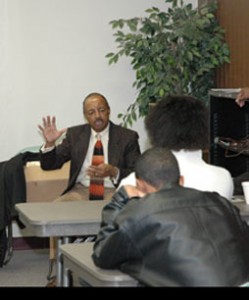By Nacole Battee/reporter

A new retention program specifically targeting the low enrollment and graduation rates of black men on TCC campuses is in progress on South Campus.
Dr. Ernest L. Thomas, South Campus president, established the African American Male Enrichment Network organization last semester.
Thomas appointed four South Campus staff members to organize and head this new group: Clifton Dobbins, testing coordinator; Zeb Strong, director of student activities, and Freddie Sandifer and Leonard Hornsby, academic advisors.
Dobbins said the graduation statistics on black men are very alarming, so that gives the group its purpose.
According to The Journal of Blacks in Higher Education, the national graduation rate for black male students is 42 percent. The journal attributes the racial climate, orientation or retention programs, geographic location, the presence of a large black student body, college curriculum and adequate K-12 preparation to the success or failure of students on campuses.
“The majority of our focus is to keep these young men in school to graduate at the associate level and successfully transfer,” Dobbins said.
The chances to become a physician or attorney or to obtain a doctorate in the sciences or mathematics are staggeringly low, he said.
One in 20 black men will be incarcerated, and one in two will never attend college.
As a father and grandfather, Dobbins said he has a personal desire to see the number of black young men in leadership roles in families, church and community increase.
“The first and second years [of college] are the most important,” he said. “We don’t want to lose them while they are here.”
Strong has brought in guest speakers and reading materials to spark interest in the young men.
“We need to become pro-active to address this situation,” he said. “We want to show students how to connect to their history, utilize school resources and bring them an eagerness to succeed.”
Taking a holistic approach in working with these young men will help them to be successful long after graduation, Strong said.
Hornsby said mentoring and encouraging are also important of the program.
“Young males need the support of other African American males,” he said.
A positive influence could encourage students to go against the grain and pursue their dreams with confidence, Hornsby said.
“We want to create an environment of trust where young men can get what they need to get started in the right direction,” he said.
TCC’s institutional research office reported to Integrated Postsecondary Education Data System, the black male graduation rate in the 2006-2007 period was 115 black male graduates among TCC’s 1,380 graduates.
Although this is a slight increase from 99 black male graduates the previous year, Hornsby said the numbers are disappointingly low, but slowly rising.
This issue has been ongoing for all colleges and universities. Hornsby said research groups and black leadership summits across the nation have discussed the issue in detail.
Students already involved with the new South Campus organization, such as Jason Mitchell, have their own concerns.
“I think it is an issue that will be hard to correct at the collegiate level,” he said.
Mitchell, who serves as a peer counselor, said the organization will help students get the resources and guidance to help them through their classes. He said he would like to see more black male teachers at the school as well.
Montrell Donnell, freshman, is enjoying learning about African-American history.
“I’m interested in learning more about my culture through the information given at the meetings,” he said.
Student Robert Oneal, freshman, was disappointed in the graduation rates.
“It’s embarrassing,” he said. “It feels like we can’t set goals and accomplish them. I want to take initiative and stay focused.”
Larry Douglas, freshman, is excited about the group’s attitude and events that have been planned.
“The group is positive,” he said, “ I want to take what I learn and pass it on to my younger brother. I’m excited about the activities that are planned.”
AAMEN will assist students in developing networking skills to take advantage of the opportunities by introducing them to black counselors and professors on South Campus.
The group encourages the young men to seek help and ask questions.
AAMEN plans to bring guest speakers to address issues such as self-respect and respect for others, grooming and etiquette and to introduce the students to black men in leadership positions.
The group will sponsor an African American Male Summit for TCC students and young men from local high schools.
AAMEN will also hold a six-session leadership class to develop students into mentors.
For information about AAMEN, contact any of the four advisers: Dobbins at 817-515-4742 or clifton.dobbins@tccd.edu, Strong at zeb.strong@tccd.edu, Hornsby at leonard.hornsby@tccd.edu or Sandifer at 817-515- 4744 or freddie.sandifer@tccd.edu.




























